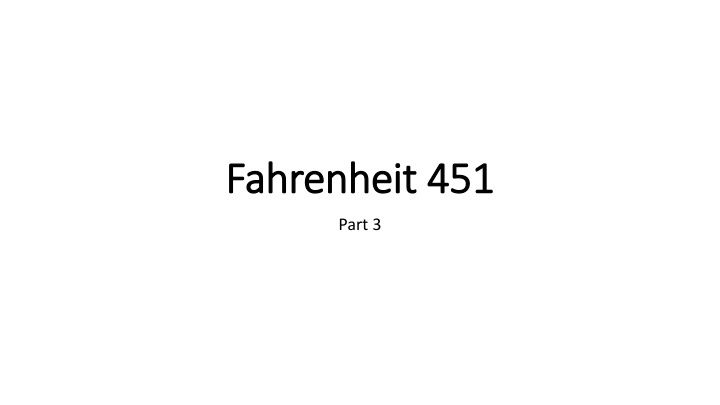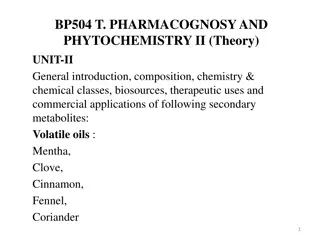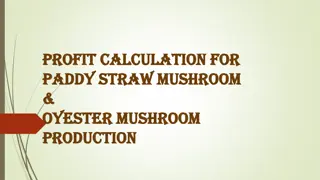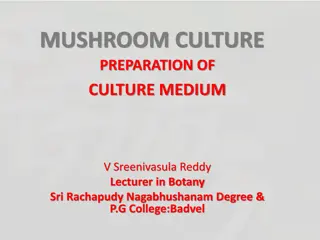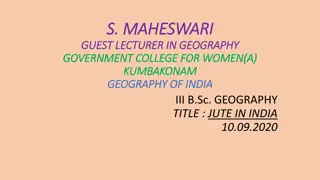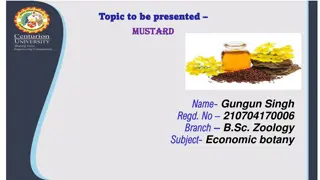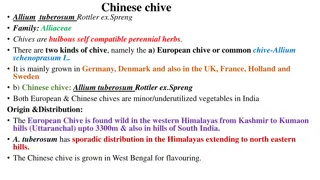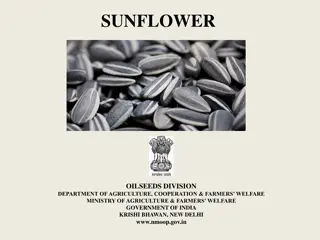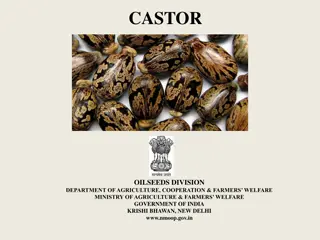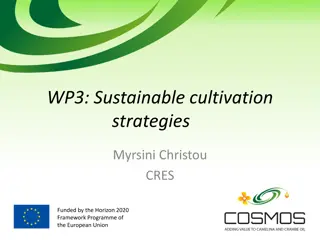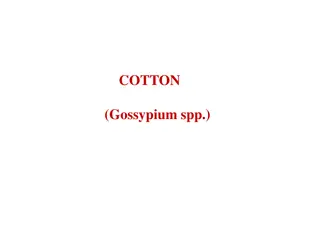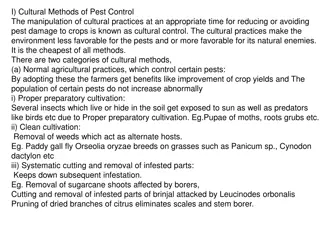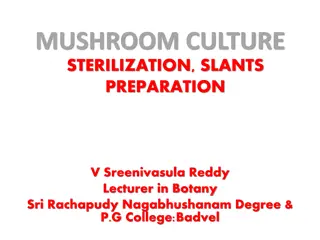Importance of Mushroom Cultivation for Human Health
Mushrooms are not plants or animals but belong to the Fungus kingdom. They are valuable sources of vitamins, minerals, and proteins, offering benefits for those with dietary restrictions like diabetes and heart problems. The cultivation of edible mushrooms can play a significant role in enriching the human diet and addressing food demand issues, especially in vegetarian populations.
Download Presentation

Please find below an Image/Link to download the presentation.
The content on the website is provided AS IS for your information and personal use only. It may not be sold, licensed, or shared on other websites without obtaining consent from the author.If you encounter any issues during the download, it is possible that the publisher has removed the file from their server.
You are allowed to download the files provided on this website for personal or commercial use, subject to the condition that they are used lawfully. All files are the property of their respective owners.
The content on the website is provided AS IS for your information and personal use only. It may not be sold, licensed, or shared on other websites without obtaining consent from the author.
E N D
Presentation Transcript
Fahrenheit 451 Fahrenheit 451 Part 3
2ndOctober Learning intentions We are learning how the plot, character and themes are developed in part 3 Success criteria Read part 3 Add notes about the characters and themes, select quotations and explain them
Its perpetual motion; the thing man wanted to It s perpetual motion; the thing man wanted to invent but never did . . . It s a mystery. . . . Its real invent but never did . . . It s a mystery. . . . Its real beauty is that it destroys responsibility and beauty is that it destroys responsibility and consequences . . . clean, quick, sure; nothing to rot consequences . . . clean, quick, sure; nothing to rot later. Antibiotic, aesthetic, practical. later. Antibiotic, aesthetic, practical. Beatty muses about the mystical nature of fire, its unexplained beauty, and the fascination it holds for people. With characteristic irony, Beatty, who has just accused Montag of not considering the consequences of his actions, then defines the beauty of fire as its ability to destroy consequences and responsibilities. What he describes is very nearly a cult of fire, a fitting depiction of their society s devotion to cleanliness and destruction.
Character notes Character notes Mildred s betrayal of Montag is complete, and he realizes that she will soon forget him as she drives away, consoling herself with her Seashell radio. Montag does not feel particularly angry at her, however; his feelings for her are only pity and regret.
Plot notes Plot notes This part of the novel is dominated by the final confrontation between Montag and Beatty. Beatty s ironic self- awareness, his understanding that his choices have not made him truly happy, seems to grow throughout the novel, and it comes to the surface in his final scene, when his behavior seems deliberately calculated to result in his own death.
Character notes Character notes Montag remains emotionally detached in this section. He enjoys burning his own house as much as he enjoyed burning those of others, and he begins to agree with Beatty that fire is removing his problems. He imagines Mildred and his whole previous life under the ashes, and feels that he is really far away and that his body is dead. Moreover, he claims that it is not exactly he who commits Beatty s murder he cannot tell if it s his hands or Beatty s reaction to them that spurs him to the act. Beatty is described as no longer human and no longer known to Montag when he catches fire.
Fire symbol Fire symbol Again, like so many other things in the novel, fire has two contradictory meanings at once. It represents Montag s subjugation and his liberation, and he achieves his final emancipation by abusing its power. Murder is, after all, a far worse crime than book burning. Only later does Montag acknowledge what he has done and feel some remorse for his actions.
Style Style Bradbury s writing style is particularly poetic in this section. He uses figurative language extensively (especially stage and circus metaphors) and often bends the rules of grammar, using sentence fragments as transitional devices and one lengthy sentence to convey the breathlessness of Montag s flight.
Theme Questions Theme Questions 6. If books and TV both have the capacity to convey information at a mass scale, then why are books so superior to television in this novel? Why does Mrs. Bowles start crying when Montag reads Dover Beach? Why does Montag choose to read poetry and not prose? And why that particular poem? What is Dover Beach about, anyway? What types of violence do we find in Fahrenheit 451? Which is the most destructive? What is it about this world that renders everyone completely fascinated by violence? 10. Did you notice that fire is repeatedly described as "beautiful" in Fahrenheit? What s up with that? 1. Faber says that books can be beaten down with reason, but that TV overwhelms the senses and can not. Is he right? Does TV really deserve so much credit here? In the digitized, mechanical world of Fahrenheit 451, what makes something real? What s more "real" books or TV? Are either really substantive? What does Mildred mean when she calls the TV her "family"? Would Montag have started down his rebellious path of self-doubt, guilt, and illegalities if it hadn t been for Clarisse? What did she do for him, exactly? Wasn t he already "different," before she came along? What is it about Clarisse that allows her to be different? How did she escape the system of homogeneity? 7. 2. 3. 8. 4. 9. 5.
Tasks Tasks 1. List the ways that Montag has changed 2. How does this section show conflict? Give detail and back your answer up with quotations 3. True or False - Beatty had given Montag a hint that he was under suspicion by sending the Hound. Explain your answer. 4. Who must have brought back the books from the garden? 5. Who said, "'When you're quite finished, you're under arrest'"? 6. What three people turned in an alarm against Montag? 7. What happened to Montag's green bullet, his electronic ear? 8. Montag shot one continuous pulse of liquid fire on whom? 9. True or False - Other Salamanders were in route to recover and destroy Mildred's four remaining books. Explain your answer.
Today Today Continue reading part 3 Try to finish it by the end of tomorrow Add notes about the key events of part 3, what we learn about Montag and add notes to the symbol sheet from part 2
Period 1 Period 1 Finish reading part 3 1. Explain what Burning Bright symbolises. (think about link to fire and revolutionary feeling) 2. What was the turning point of the book? Why do you think that? How did it impact on the rest of the book? 3. How has Montag changed throughout the book? (think about his personality, actions and also relationships with other characters)
Burning Bright Burning Bright This could link to the destructive force of the fire destroys Montag s home and also that destroys Beatty The rebellion is not just burning inside Montag, as he discovers that others are trying to preserve knowledge and keep intelligence alive. Creates a sense of power Could also link to the rebellion burning inside Montag that has reached a new level
Techniques Techniques Bradbury uses several devices to heighten the tension of the chase sequence, including the use of dramatic pauses (such as when the Hound pauses on Faber s lawn), the description of the Hound s progress from Montag s perspective, and the countdown to the look-out in which everybody is to open their doors. Montag is presented as against everyone else. Links to the theme of censorship and control as the truth about him is being manipulated
Notes Notes Montag leaves the frightening unreality of the city, which he thinks of as a stage of actors and a s ance of ghosts, and enters the world of the countryside, which feels equally unreal to him because of its newness. As he contemplates the silence of the countryside, Montag s thoughts turn to Mildred. He realizes she would not be able to tolerate the silence and is saddened at the thought. In contrast, Montag feels increasingly comfortable in the presence of nature, becoming fully aware of his entire body. He no longer feels that his mind, hands, and blood are separate entities, as he did in the city. Montag becomes a whole person for the first time. Links to his view of Mildred as both dead and alive This also links to the theme of nature as it something almost unknown to Montag
Notes Notes Granger s ironic welcoming of Montag back from the dead symbolizes Montag s rebirth into a more meaningful life. Bradbury employs butterfly imagery throughout the book, specifically to describe the death of burning books, so the idea of metamorphosis or transformation has been foreshadowed. When Montag sees the enemy bombers, his thoughts turn to the people he has lost: Clarisse, Faber, and Mildred. When the bombs obliterate the city, he suddenly remembers that he met Mildred in Chicago, suggesting that he has somehow managed to feel the connection that was missing when she was alive.
Notes Notes Granger compares mankind to the phoenix, a mythological creature that is consumed by fire only to rise from its own ashes in a cycle that it repeats eternally. Granger s story about his grandfather, with its moral about the importance of leaving one s mark on the world, resonates with Montag s desire to leave a meaningful legacy. At the end of the novel, Granger remarks that they should build a mirror factory so mankind can look at itself. This recalls Montag s description of Clarisse as a mirror in the beginning of The Hearth and the Salamander. Mirrors are a symbol of self-understanding, of seeing oneself clearly. From the beginning of the novel he has been growing increasingly dissatisfied with a life based on empty pleasures and devoid of real connections to other people.
Theme Questions Theme Questions 6. If books and TV both have the capacity to convey information at a mass scale, then why are books so superior to television in this novel? Why does Mrs. Bowles start crying when Montag reads Dover Beach? Why does Montag choose to read poetry and not prose? And why that particular poem? What is Dover Beach about, anyway? What types of violence do we find in Fahrenheit 451? Which is the most destructive? What is it about this world that renders everyone completely fascinated by violence? 10. Did you notice that fire is repeatedly described as "beautiful" in Fahrenheit? What s up with that? 1. Faber says that books can be beaten down with reason, but that TV overwhelms the senses and can not. Is he right? Does TV really deserve so much credit here? In the digitized, mechanical world of Fahrenheit 451, what makes something real? What s more "real" books or TV? Are either really substantive? What does Mildred mean when she calls the TV her "family"? Would Montag have started down his rebellious path of self-doubt, guilt, and illegalities if it hadn t been for Clarisse? What did she do for him, exactly? Wasn t he already "different," before she came along? What is it about Clarisse that allows her to be different? How did she escape the system of homogeneity? 7. 2. 3. 8. 4. 9. 5.
Tasks Tasks 1. List the ways that Montag has changed 2. How does this section show conflict? Give detail and back your answer up with quotations 3. True or False - Beatty had given Montag a hint that he was under suspicion by sending the Hound. Explain your answer. 4. Who must have brought back the books from the garden? 5. Who said, "'When you're quite finished, you're under arrest'"? 6. What three people turned in an alarm against Montag? 7. What happened to Montag's green bullet, his electronic ear? 8. Montag shot one continuous pulse of liquid fire on whom? 9. True or False - Other Salamanders were in route to recover and destroy Mildred's four remaining books. Explain your answer.
9 9th thOctober October Complete an essay plan for the title marked on the sheet and 2 others Think what points would you be relevant, back them up with a quote, pick a technique used in this quote and explain what it means
Confrontational relationship Montag and Beatty Beatty manipulates Montag to return to work Montag is afraid of Beatty Montag kills Beatty Beatty uses books and knowledge against Montag Awareness of Montag s changing ideology Montag s questioning Confrontational/Corrosive relationship Montag and Mildred Montag wouldn t care if she was dead Can t remember where they met (no close feelings) Forces Mildred to read with him Mildred destroys his books Mildred turns him in to the authorities Attitudes to the TV walls and family
